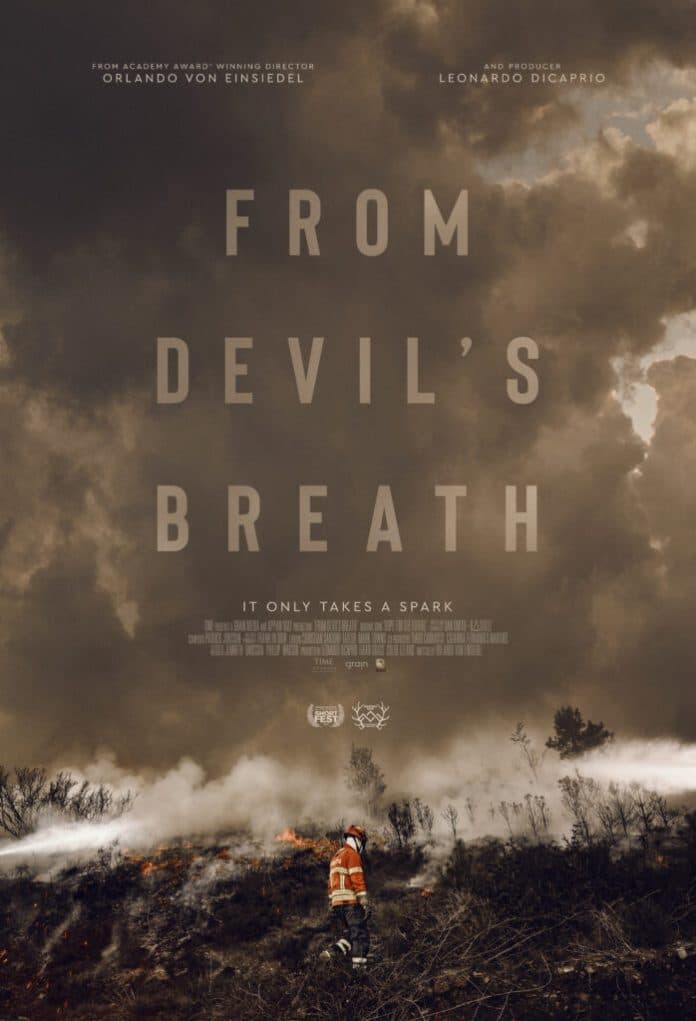“Nature isn’t just something that we need to survive; it’s the reason we want to survive.” – Professor Tom Crowther
To mark World Biodiversity Day and the UN Decade on Ecosystem Restoration, Ciné-ONU was proud to host a virtual screening of ‘From Devil’s Breath’ on Tuesday 24 May, in partnership with the UN Environment Programme (UNEP) and the Food and Agriculture Organisation of the UN (FAO).
The film tells the unlikely story of two remarkable narratives that come crashing together; the extraordinary, inspiring community of survivors of the deadly 2017 wildfires in Portugal, fighting to ensure what they’ve lived through can never happen again; and a revolutionary, world-changing scientific discovery which could help protect us all from the climate emergency.
Participants were welcomed by Raschad Al-Khafaji, Director of FAO Brussels, before a pre-recorded introduction from the director himself, Orlando von Einsiedel. The screening was followed by a panel discussion with the film’s producer, Harri Grace; one of its protagonists and founder of the Crowther Lab, Professor Tom Crowther; and the Head of Nature for Climate Branch at UNEP, Mirey Atallah. The discussion was moderated by António Ferrari, Desk Officer for Portugal at the UN’s Regional Information Centre in Brussels, and the event was brought to a close by Veronika Hunt Šafránková, Head of UNEP Brussels Office.
A refusal to give up hope
In his opening remarks, the Director of FAO Brussels Raschad Al-Khafaji introduced a key theme of both the film and subsequent panel discussion: economic sustainability. As he highlighted, “restoring our lands will not only save our lives, but it will also make financial sense, and this is extremely important in these challenging economic contexts that we live in.” Speaking on the UN Decade on Ecosystem Restoration, he painted an inspiring picture of its goals: “the overarching vision for the UN Decade is a world where the relationship between humans and nature has been restored; where healthy ecosystems are expanding; and where ecosystem loss, fragmentation and degradation have been ended.”

Participants were also treated to a message from the film’s Oscar-winning director, Orlando von Einsiedel, who spoke of his personal investment in its subject: “as a filmmaker, as a father to a young son and as a very concerned and upset global citizen, I am always looking to try and tell stories about the climate emergency. This is the issue of our age.” Like Raschad Al-Khafaji, the director was able to draw an optimistic message from the film’s cautionary tale: “while tragedy is part of this film, bravery and a refusal to give up hope are there in abundance, and I hope it’s these facets that stay with you when you finish watching the film.”
Producer Harri Grace likewise touched on the emotions behind the filmmaking, remarking that “we felt a huge amount of responsibility to tell those stories in a respectful and sensitive way, because it was such a significant moment for that community, and a significant moment for Portugal as well”. He spoke movingly of the individuals who share their stories in the film, reflecting that “despite all they have suffered from, they are moving forward.”
Investing in the future
Such hope, however, cannot begin to offset the extraordinary loss and suffering caused by the wildfires documented in the film. Professor Tom Crowther, founder of Crowther Labs, highlighted the need for investments to pave the way for solutions to extreme ecological challenges such as these. “At every location on the planet, there are opportunities and solutions that make nature the most economically viable option for local people. We need investments to help us have enough time to find those solutions.” He, too, drew attention to the economic advantages of taking action now: “time and time again, every analysis shows that the cost of not investing in nature and climate action is 8, 10, 12 times higher than the cost of investing in climate action and nature. From an economic perspective, it makes obvious sense to be sustainable.”

Mirey Atallah, Head of Nature for Climate Branch at UNEP, spoke of the key demographic involved in such solutions. “We are seeing a huge mobilization of youth and local communities, and this is where things will matter. It’s the next generation that will define the decade, and it is local communities, as we have seen in the film, that will take their local ecosystem in their own hands and change it.”
Rising threat
Drawing the event to a close, Veronika Hunt Šafránková, Head of UNEP Brussels Office, summarised the stark warning of the film, which is echoed in the recent UNEP and GRID-Arendal report ‘Spreading like Wildfire: The Rising Threat of Extraordinary Landscape Fires’. As she remarked, “we have to work with the current situation that extreme events are happening at a much greater scale than they used to, and they are happening in places where they didn’t happen before.”
Ciné-ONU would like to thank all of the speakers and the audience for their contributions to an inspiring and insightful discussion on a very important topic, and our partners UNEP and FAO for a successful screening.
Follow us on Facebook and Twitter for more information on upcoming Ciné-ONU events.



